
History of AACTfest
Explore how AACTFest evolved from its beginnings in the 1960s to the national celebration of community theatre it is today. Learn how the first festival in 1971 grew into AACTFest, officially named in 1987, and discover the workshops, performances, and events that have shaped its rich history.
A History of AACTFest
>> Return to the "Our History" page
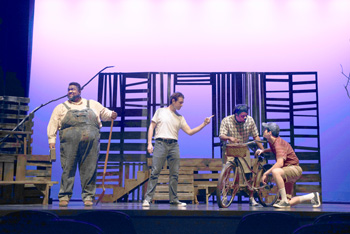
Since the 1960s, the national community theatre festival has gone through an evolution to become today's AACTFest, an official program of the American Association of Community Theatre (AACT).
The first national theatre festival for community theatre was held in 1971 by AACT's predecessor, ACTA. The first festival to be named AACTFest was hosted in 1987. Since then, the festival has grown and expanded, with performances by both adult and youth theatre companies, workshops, keynote speakers, a silent auction, social gatherings, and special events.
[Photo: Wetumpka Depot Players production of A Storm Came Up, AACTFest 2023]
Today, the festival's current goals are:
- To provide an optimum learning experience through festival entry, which affirms, supports, and nurtures community theatre companies as they strive toward excellence in theatrical productions.
- To stimulate and inspire community theatre companies to strive for the best work possible and to recognize them for their achievement through an appropriate adjudication process.
- To provide a learning experience in artistic, technical, and management areas for people in attendance through performances, adjudication, and workshops.
- To develop enlightened and discerning audiences for community theatre.
>> Continue on this page for festivals through 1999.
For festivals since 2000, click here.
Beginnings
AACTFest had its roots in the 1957 World Festival of Amateur Theatre (Le Festival Mondiale du Théâtre Amateur) was held in Monaco under the patronage of Prince Ranier and Princess Grace. This was the first official festival of the International Amateur Theatre Association (AITA/IATA), and random theatres from America took turns representing the U.S. at this quadrennial international event.
(It should be noted that the definition of “amateur” used by AITA/IATA is the traditional one, derived from the Latin word amare (love). In this sense, “amateur” refers to a person who does something for love and pleasure, rather than someone who acts as a profession (thus ,the original meaning of the term, “professional.”)
>> The Birth of AACTFest: Reflections on the Festival from the first ideas to the first events. by Art Cole [Excerpted from a speech presented at the Southwest Theatre Conference in November 2003. Reprinted from Spotlight, December 2004.]
1960-1969
After eight years, the World Festival organization contacted the American National Theatre and Academy (ANTA), asking it to provide input as to which theatres from the U.S. should attend the World Festival. ANTA felt it would be more appropriate to pass the invitation on to the American Community Theatre Association (ACTA)—at that time, the community theatre division of the seven- year-old American Theatre Association (ATA). In 1965 ACTA consisted of approximately 12 to 14 community theatres.
Howard Orms, the President of ACTA, contacted several theatres, with no success. Then Art Cole of Midland (TX) Community Theatre agreed to take a production of Edward Albee's An American Dream to the 1965 World Festival as the U.S. representative. The Monaco festival would provide free lodging to 10 company members for three days, plus $1,200 for travel expenses.
Cole’s plan was to find a one-act play that could be cast with three or four people willing to pay their own way for a chance to perform in Monte Carlo. At first skeptical, Midland’s board of directors soon realized that this was not the way that Midland (or the U.S.) should be represented, and pledged to support the entire project.
While pondering the entire experience on the return flight from Monaco after that first festival, Cole came to a conclusion: There ought to be some sort of qualitative selection process to pick the theatre that will represent the U.S., and that theatre should not have to pay its way. But what would that process be? A national festival? He knew nothing about running such a festival, but knew that something had to be done before 1969 and the next Monaco festival. He began with a West Texas Festival in 1966, with theatres coming from five other cities to perform for one hour (a la Monaco). He followed that up in 1967 with a Texas state festival, funded by one of the first grants given by the Texas Commission on the Arts.
Cole’s next endeavor was not as successful—a national festival that would take place at the Kennedy Center for the Performing Arts in Washington, D.C. This venue would allow community theatres to showcase their talents for members of Congress and other funding sources. His comments on the experience? “I came away with my head bloodied and bowed. I soon discovered that amateur theatre was almost a dirty word when it came to raising money.” A trip to New York to interest airlines in funding the project also came to naught.

By now it was 1968 and the proposal for a national festival in Washington had been dropped. If the theatres couldn’t come to the festival, the festival would be taken to the theatres. Jim Cavanaugh of the Omaha (NE) Community Playhouse agreed to chair the project. He contacted interested theatres and set up a loosely structured festival to be held in five regions. In all, 49 theatres participated, performing plays by American playwrights, as a salute to our national cultural resources. Three judges, Art Cole (president of ACTA), Kay Fliehr (with both Guthrie Theatre and Theatre-In-The-Round of Minneapolis, MN) and Norman Nadel (theatre critic and columnist for Scripps-Howard newspapers, NY), traveled 11,000 miles in five weekends viewing the entries. The five theatres hosting the regional festivals were the Polka Dot Playhouse in Bridgeport, CT; the Abbeville (SC) Little Theatre; the San Antonio (TX) Little Theatre; the Stockton (CA) Civic Theatre; and the Omaha (NE) Community Playhouse. At the end of the festival, the production of Chamber Music by Arthur Kopit, produced by Entr'actors of Worchester, MA, was chosen to represent the U.S. in Monaco in 1969.
Relying upon assurances from the Executive Secretary of the American Theatre Association, ACTA made its own assurances that it would pay most of the winner’s Monaco expenses. However, after the winner had been selected, ATA informed ACTA that funding was not available, and ATA’s executive director advised Entr’actors to cancel the trip. Art Cole, having given his word that there would be money for the winner, took out a $5,000 personal loan to fund Chamber Music’s travel expenses. Fortunately for Cole, a number of generous donations helped repay the loan.
Following that, ACTA organized nine festival regions and set up operating rules, following the Monaco regulation of 60-minute productions. It was decided to hold an official ACTA National Festival every two years, with participants who had previously won state and regional festivals. This system was inaugurated in 1971. (In non-festival years, a production would be chosen to represent the U.S. in Monaco.)
1970-1979
The first National Festival of American Community Theatre (FACT) was held at the Theatre of Western Springs, IL. Top honors went to the Tulsa (OK) Little Theatre for its production of Holman's The Baptizin’. Judges were Henry Fonda, William Glover (New York drama critic), and Michael Langham (Artistic Director of the Guthrie Theatre, Minneapolis, MN). Kay Fliehr was the festival chair.
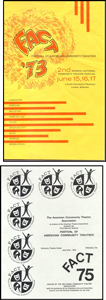
In 1973, at the festival held at the Lincoln (NE) Community Playhouse, Theatre-in-the-Round Players of Minneapolis was selected to represent the U.S. in Monaco with its production of an original play The Unknown Soldier by Warren Frost. Judges were Barry Nelson (Los Angeles, CA), Norman Nadel (theatre critic for Scripps-Howard newspapers, NY); and Richard Christensen (drama critic, Chicago, IL). John Wilson, the Lincoln (NE) Community Playhouse director was the festival chair.
Theatre Memphis' (TN) production of Bovasso's Schubert's Last Serenade received top honors at the 1975 FACT in Oklahoma City's Theatre Center. Judges were Jerome Lawrence (playwright), Edgar A. Wright (actor- director of Hollywood, CA), and Lloyd Richards (Hunter College, NY). The festival chair was Betty Wagner from Stillwater, OK. The Oklahoma festival was honored by the attendance of the members of the IATA Governing Council, which held its official meetings prior to the festival. Immediately following FACT, the international visitors attended one of the first world amateur theatre festivals in the United States, in Detroit, Michigan, where the International Theatre Olympiad was held. Theatre Memphis presented its festival production as one of the 30 theatre performances in eight different theatres, with nine international companies participating. Chair of the Olympiad '75 was Shirley Harbin, assisted by Chancey Miller, both ACTA members.
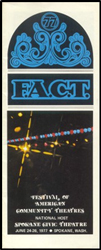
The 1977 FACT at Spokane (WA) Civic Theatre received $10,000 in funding from the National Endowment for the Arts (NEA). The Footlighters of Cincinnati (OH) was named as the Monaco representative with its production of Hoffman and Gasman's What's a Nice Country Like Us Doing in a State Like This? Judges were actress Rosemary DeCamp (Hollywood, CA), Ronald A. Willis (University of Kansas), and David Ball (Lawrence University, Appleton, WI). Festival chair was Betty Tomlinson of the Spokane Civic Theatre.
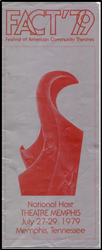
The 1979 FACT was held at Theatre Memphis (TN), co-chaired by Mickey Laukhuff and Bea Miller. The festival was also recipient of a grant from the NEA—the last money received from the National Endowment for the Arts, which had decided to fund only professional endeavors. First honors went to Topeka (KS) Civic Theatre's production of Neil Simon's The Good Doctor. Judges were actress Barbara Cason (Los Angeles, CA), Theodore E. Kalem (Time Magazine, NY) and Craig Noel (Old Globe Theatre, San Diego, CA). With FACT '79 came a concerted effort to provide the "non-Monaco" year's winner an opportunity to participate in an international festival. Thus, began FACT's increased involvement with festivals around the world. The winner in 1979 went to Dundalk, Ireland; a runner-up went to Villach, Austria.
1980-1989
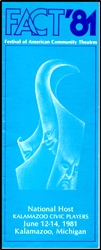
In 1981, the festival host was Kalamazoo (MI) Civic Players with Jim Carver, Managing Director of the theatre, chairing the event. Judges were Richard Hamburger (Julliard Center, NY), Davey Marlin-Jones (film critic, Washington, DC) and Edwin Procunier (University of Western Ontario, London, Ontario). Their Monaco choice was the Theatre Tulsa (OK) production of an original script, Stations, by James Vance. The second-place production of Suicide in B-flat by the Garrett (MA) Players represented the United States in Finland.

In 1983, the National FACT was held at the Chilkat Center for the Arts in Haines, Alaska, hosted by the Alaska State Community Theatre Association and chaired by Mimi Gregg of Haines. The decision to hold the festival in Alaska was somewhat controversial at the time, due to the anticipated travel costs.. However, the festival raised enough money to pay all the travel expenses for all the participating companies, as well as a large portion of the expenses of the ACTA board of directors. Adjudicators were Ella Gerber (New York), John Going (Anchorage, Alaska) and Ronald T. O'Leary (University of Maryland). The winner was Omaha (NE) Center Stage's production of the Fats Waller musical celebration, Ain't Misbehavin'. Runner-up was Kalamazoo (MI) Civic Players’ production of the Neil Simon comedy, Fools. Omaha became the United States representative at the international festival at Toyama, Japan, while Kalamazoo was invited to perform in Manchester, England. Owing to the extreme success of the festival’s fundraising, the Haines festival produced a comfortable profit and issued a challenge grant to ACTA for $3000 to create a separate entity which would raise, invest, and distribute money to groups competing at the national festival. This was the beginning of the Community Theatre Foundation (now the AACT Foundation.)
In February of 1985 the Community Theatre Foundation was officially incorporated, and the ACTA board members pledged enough to match the $3000 Alaska challenge grant. A policy regarding distribution was also adopted –no principal or interest would be spent until the foundation had at least $30,000.
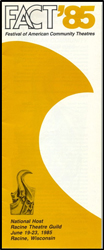
The 1985 National FACT was hosted by the Racine (WI) Theatre Guild. JoAnne Nissen chaired the festival . Art Cole (Director Emeritus of the Midland [TX] Community Theatre), N. Richard Nash (author of The Rainmaker), and Richard Coe (Critic Emeritus of the Washington Post) were adjudicators. The winner, which went on to Monaco, was the production of James McLure’s Lone Star presented by the Mummers Theatre of Oklahoma City (OK). Also receiving international invitations were the second-place production of Bubbling Brown Sugar by the Bonfils Theatre of Denver, CO and the Topeka, KS third-place production of I’m Getting My Act Together and Taking It On the Road. At the festival, it was announced that the fledgling Community Theatre Foundation had already received over $20,000.
In 1986, the American Theatre Association dissolved as an entity. Along with this dissolution went both ACTA and the FACT name. Rising from the ashes was the American Association of Community Theatre (AACT). Taking up the torch, AACT continued the FACT tradition with a new name—AACTFest.
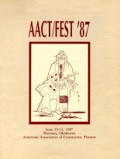
The first AACTFest was hosted in 1987 by the Oklahoma Community Theatre Association. under the joint chair of Mary S. Patterson and Gregory Kunesh at the University of Oklahoma in Norman, OK. Judges were Suzanne Bennett (Literary Manager of the Women's Project at the American Place Theatre, NY), Jim Carver (Managing Director of Kalamazoo [MI] Civic Players) and Jack Wright (Artistic Director of Theatre at the University of Kansas). Molly Newman and Barbara Damashek's Quilters presented by the Laguna Moulton Playhouse (Laguna Beach, CA) triumphed and represented the U.S. in Dundalk, Ireland. Second place went to the Black Liberated Arts Center of Oklahoma City with its production of Blood Knot by Athol Fugard. They also represented the U.S. at Montreal's National Multicultural Festival.
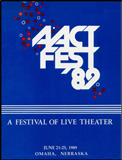
The second AACTFest was held in 1989 at the Omaha (NE) Community Playhouse, co-chaired by Jon Kerkhoff and Ginny Winsor. The judges in Omaha were Patton Campbell (Associate Professor, Columbia University), Martha Wadsworth Coigney (Director of the International Theatre Institute) and Edwin Procunier (Professor Emeritus, University of Western Ontario). First place went to the Spokane Civic Theatre's production of Getting Out. This work by Marsha Norman was also the 1989 United States performance at the World Festival of Amateur Theatre in Monaco. Toyama, Japan was the next stop for the second-place production by the Encore Theatre Company from Washington, D.C., with a production of Home by Samm-Art Williams.
1990-1999
In June of 1990, the Community Theatre Foundation reached its milestone of $30,000 and announced that it would distribute $3,000 at the next national festival.
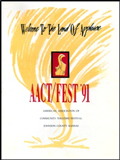
AACTFest '91 was held in Overland Park, KS at Johnson County Community College. Festival chair Gerald Snider and his team engaged adjudicators, Jerry L. Crawford (Professor of Theatre, University of Nevada - Las Vegas), Mona Synoground Poehling (former Executive Director, Oklahoma Community Theatre Association), and Ron O'Leary (University of Maryland). The first-place production was Stephen Sondheim and James Lapine's Into the Woods, presented by the Footlite Musicals from Indianapolis, IN. Topeka (KS) Civic Theatre was the runner-up with its production of The Taffetas by Rich Lewis. After AACTFest, Into the Woods was invited to Toyama, Japan, and The Taffetas was invited to perform in Aruba. The Community Theatre Foundation distributed $500 to the second- and third-place productions, and $1,000 to the first-place company. The remaining companies received $100 each.
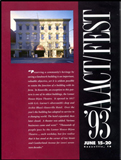
AACTFest traveled to Knoxville, TN, in 1993 to be hosted at the Bijou Theatre Center. Festival chair Stephen Krempasky was assisted by Mary Louise Smith of the Tennessee Theatre Association as a co- host. Adjudicators were Terrance McKerrs (freelance director), Malinda Pacha (scenic and costume designer with the University of Detroit - Mercy), and David Young (former producing director of ACTF at the Kennedy Center). The Vokes Players of Wayland, MA was awarded first place for their presentation of David Mamet’s Glengarry Glen Ross. The Cheyenne (WY) Little Theatre production of Terra Nova, by Ted Tally, received second-place honors. The majority of the theatres were given the opportunity to represent the U.S. at international festivals. The Community Theatre Foundation distributed $3,000, using the same guidelines as it had at the 1991 festival.
In 1994, the trustees of the Community Theatre Foundation decided to dissolve as a separate legal entity, with the AACT Board agreeing to receive and convert the foundation funds into a separate, legally protected endowment fund within the AACT structure, now known as the AACT Foundation.
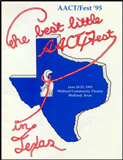
AACTFest 1995, billed as “The Best Little AACTFest in Texas,” was hosted by Midland Community Theatre in Midland, TX. The festival chair was Don Bachmann, with Marilyn Allen as honorary chair. Adjudicators were Kent Brown (professor of drama at the University of Arkansas, Fayetteville), Ron Cameron (academic coordinator for the music theatre department at Sheridan College in Oakville, Ontario, Canada). David Young (former producing director of ACTF at the Kennedy Center) was a last-minute substitution for Gresna Dody (alumni professor and former chair of the Department of Theatre at Louisiana State University) ,who became ill before the first production. The Oak Ridge (TN) Community Playhouse took first-place honors with William Finn and James Lapine’s Falsettoland, and accepted a bid to a festival in Aruba. Out North, from Anchorage (AK), took second place with The Mommy Dance by Jill Bess. The Kalamazoo (MI) Civic Players’ production of Brian Friel’s Dancing At Lughnasa received third place accolades and represented the United States in Monaco.
Again, $3,000 was distributed from the AACT Endowment Fund to the participating national companies. The fund had now grown to $70,000, with a goal of $100,000. A policy was adopted to distribute no more than 60% of the accumulated interest, rolling over the other 40% to help build the corpus.
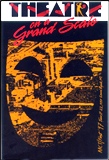
“Theatre on a Grand Scale,” AACTFest 1997, was co-chaired by Randy Hoekstra and Jill Patchin in Grand Rapids, MI, at the Grand Rapids Civic Theatre. The adjudicators for the festival were Annette Procunier (director and designer from Ontario, Canada), Brid McBride (freelance journalist and art critic from Dundalk, Ireland), and Mortimer “Mort” Clark (professor of theatre, Westchester Community College, NY). Their decision gave first place honors to Smoke on the Mountain, produced by the Mobile (AL) Theatre Guild. Coming in second was the Spokane (WA) Civic Theatre production of Mama Drama. And capturing third place was the La Crosse (WI) Community Theatre’s production of Cotton Patch Gospel. Mobile received an invitation to Dundalk, Ireland, and La Crosse received an invitation to Quebec, Canada. The Endowment Fund distributed $500 to the second and third place productions, and $1,000 to the first-place company. In addition, $100 was given to each participating company
In June 1998, the endowment fund trustees decided to calculate the total amount to be distributed at any festival by adding together the endowment's Festival Support Fund value of the two previous fiscal years (audited); the money available would be an amount not to exceed 5% of the total of those two years.
In 1999, AACTFest was back in Memphis, TN. “Memphis rocks,” hosted by Theatre Memphis, was co-chaired by Michael Fortner and Bea Miller. Adjudicating were Bennett Wood (actor, teacher, author, Memphis, TN), Jack Wright (Professor of Theatre and Film, University of Kansas) and Kent Brown (freelance director, Fairfield, CT). First place was awarded to Spokane (WA) Civic Theatre’s production of Steven Dietz’ Lonely Planet. Second place went to Charleston (NC) Stage Company’s production of Adam Long, Daniel Singer and Jess Winfield’s The Complete Works of William Shakespeare (abridged). The Chameleon Theatre Circle from Apple Valley, MN, garnered third place with Assassins, by Stephen Sondheim and John Weidmen. However, Spokane Civic—feeling that international travel was beyond the resources of their group—asked not to be considered for any international festivals. Instead, Charleston Stage Company received invitations to both Ireland and Aruba, while the Chameleon Theatre Circle accepted an invitation to travel to Nova Scotia, Canada. This festival also saw a change in how the money from the AACT Endowment Fund was distributed: equal amounts of $750 were distributed to each production at the national festival.